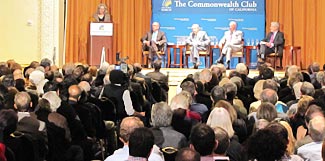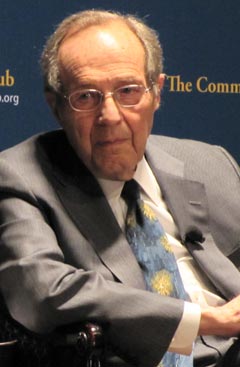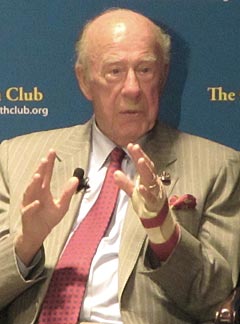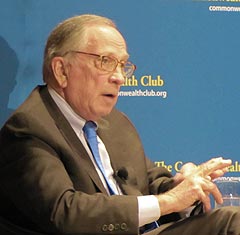Feb 23, 2012. San Francisco.
George Shultz, Sam Nunn, William Perry spoke at a San Francisco Commonwealth Club event, “The Nuclear Chessboard, 2012“. These excerpts focus on Iran’s suspected nuclear weapons development program.
 |
| The panel before a packed auditorium at the Mark Hopkins Hotel |
The three elder statesmen, featured in moderator Philip Taubman’s recent book “The Partnership: Five Cold Warriors and Their Quest to Ban the Bomb”, made comments mostly consistent with recent statements coming from the Obama administration, which boil down to a good-cop bad-cop strategy where international economic sanctions against Iran are promoted as a means to both stop Iran’s alleged nuclear weapons program and also stave off a dangerous Israeli military attack.
A few complicating issues were not addressed in the short time available: 1) Does the legacy of false W.M.D. claims that were used to justify the Iraq war weaken the credibility of United State as a broker in the Iran situation, possibly impacting cooperation from China and Russia? 2) What would the environmental consequences and political precedent be of an Israeli attack on Iran’s nuclear reactor and other nuclear facilities? Would radioactivity be released and how dangerous would this be to Iran and surrounding regions? 3) Does de facto acceptance of Israel’s nuclear arsenal weaken the U.S. case against Iranian nuclear weapons? 4) Could at attack on Iran bring about the very thing it would purport to avoid? Might nuclear weapons be used in an attempt to either destroy hardened targets, or as a punitive response if Iran responded unpredictably or against civilians outside of Iran?
 |
| “Our best chance of doing that is through what I would call coercive diplomacy. Diplomacy, but with a very heavy threat behind it.” ~William Perry |
Transcription:
William Perry, Former U.S Secretary of Defense: I believe that Iran has been moving seriously and energetically for the last ten to fifteen years to develop a nuclear weapon, I think that probably within a few years of achieving that goal. This in spite of the fact that they have consistently denied that they are doing that. I also believe that the government of Israel believes that a nuclear weapon in Iran poses an existential threat to their country, and is determined to prevent that from happening, possibly with a military strike. A military strike, even if successful, would have a whole host of unintended consequences, nearly all of them bad. So, I think our role in the United States is to try to provide reasons for Israel for not taking that strike, and the only reasons that hold up are that we are taking actions in concert with other nations in the world to stop Iran from getting a nuclear weapon.
Our best chance of doing that is through what I would call coercive diplomacy. Diplomacy, but with a very heavy threat behind it. I think the most effective threat against Iran is shutting down their financial transactions which indeed we are starting to doing in the last few months. I believe if we can continue that pressure and increase that pressure we could be successful in putting enough pressure on Iran to stop the program. The weakness of that today is that Russia is only partially cooperating and China not at all. And our diplomatic role that has to convince Russia and China that a military attack on Iran would have deleterious consequences not only for Iran and the United States and Israel, but for Russia and China also, and therefore to get behind this program to put real pressure on Iran.
 |
| “It seems to me we can’t allow Iran to sort of draw out a long diplomatic process which they simply use to gain time to develop their weapons” ~ George Shultz |
George Shultz, Former U.S Secretary of State: I subscribe to what Bill said completely. However, if we have a situation where sanctions are beginning to really work in Iran, and it looks to me as though they probably are, the financial pressures are great that is the real pressure point. It seems to me we can’t allow Iran to sort of draw out a long diplomatic process which they simply use to gain time to develop their weapons. So I think we’d have to move energetically, and I would say to them something like this, look, you say you’re developing your enrichment capacity for peaceful purposes. The volume of the enrichment that you’re doing far exceeds any domestic use you may have in a nuclear power plant. You’ve only got one plant. The Russians are supplying the fuel for it as it is. So if you mean it that this is for civilian purposes, you must be wanting to sell your enriched uranium on the international market, so we’ll help you do it.
And that means that you have to be part of some international nuclear fuel cycle regime that includes having knowledgeable people and quite a few of them in your plant so that we know exactly what’ s going on, that you’re not enriching to weapons grade. But this would have to be done rapidly, because people uses negotiations just as a stall, to gain time.
I might say that Senator Nunn and his organization have really done yeomen work in developing the nuclear fuel cycle idea and have had a lot to do with creating a fuel bank that can be used by countries so they don’t have to enrich uranium themselves, and I think there is the making an international regime here.
But if you’re going to wait and see what sanctions do, then I think you need to have some sort of a proposal, and I wouldn’t just sit and namby pamby around. I’d say okay, you say it’s for civilian purposes, I’m calling that card.
 |
| “So this is not a raid like we’ve seen before on Iraq and Syria. It’s a big deal. It has a lot of consequences. We gotta think through it.” ~ Sam Nunn |
Former U.S. Senator Sam Nunn:
In the case of Iran I might just say, it’s a difficult scenario.
If they do get nuclear weapons they’re going to be several other countries in that part of the world that will get, in my view that will have a very active quest for nuclear weapons. If we have a conflict it has all sorts of implications. It would not be an over and out type of conflict. You’d have to take out their defensive missiles. If you were serious about it, you’d have to take out their nuclear sites and there’s certainly not one or two there are a lot more than that. Sidney Drell, our physicist partner that’s portrayed in this book [The Partnership: Five Cold Warriors and Their Quest to Ban the Bomb] reminded us yesterday afternoon, you need to take out the electrical grid also, would have huge implications to their nuclear program. Since they have threatened to close the Persian Gulf, you’d would really need to take out their navy and probably a lot of their air force.
So this is not a raid like we’ve seen before on Iraq and Syria. It’s a big deal. It has a lot of consequences. We gotta think through it. But I do believe there is some hope because the Iranians are in a real economic squeeze now. First of all they’ve got a bad economic system, and second, the embargoes are having some effect. The evaluation of their currency has gone down about 30% in the last six months. So they are feeling the pain. Unfortunately, a lot of innocent people suffer, and that is something you always are concerned about, but the alternatives are pretty grim. And if of course we had a war there would be even more suffering. So the embargo has got to be tightened, we’ve got to do everything we can to persuade China and Russia to participate in it. The Europeans are beginning to be very assertive, talking about cutting off the import of Iranian oil – all that may have an effect.
The only other.. if there’s anything regarding Iran these days that’s a bright spot, is a dark bright spot. I would say the one dark bright spot here is that they contend over and over again – though we don’t believe them and shouldn’t believe them – that they don’t have a weapon program and they’re not going to have a weapon program, and their Ayatollah just said it would be a sin to develop weapons. Now do I believe that, no, but do I think that is important yes, because it is a face saving place to come down, if we can come up with a concept like George talked about, with some type of international enrichment centers, that are under 24 by 7 IAEA camera and control. So, that’s the dark bright spot in a very difficult situation.
Report by James George



























































